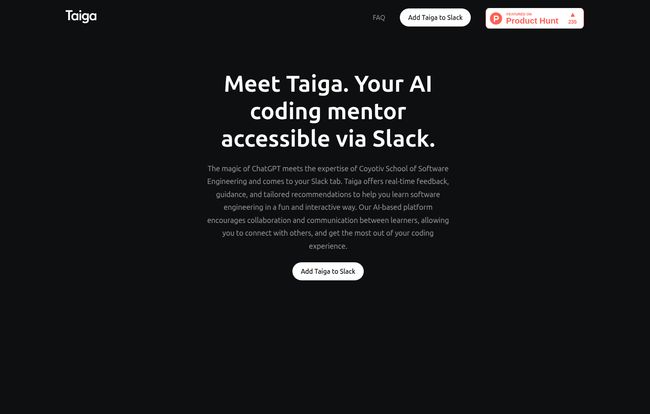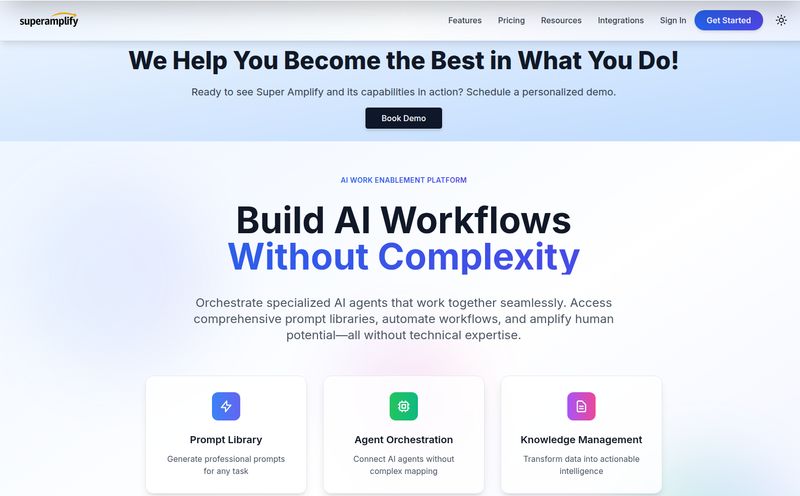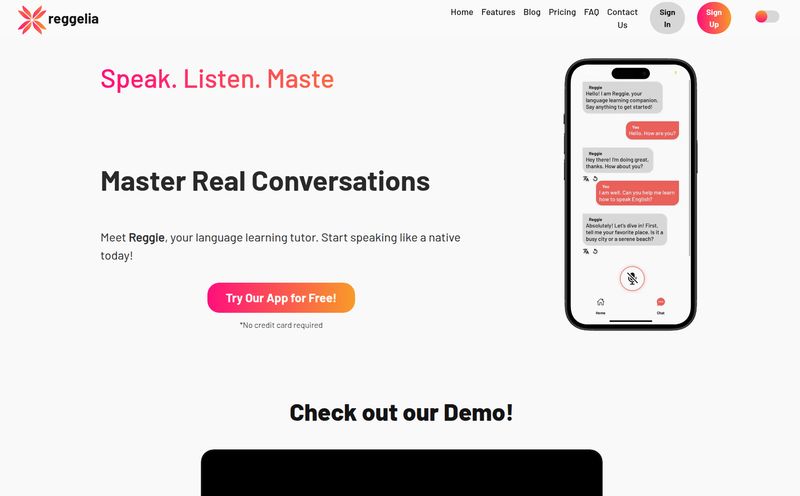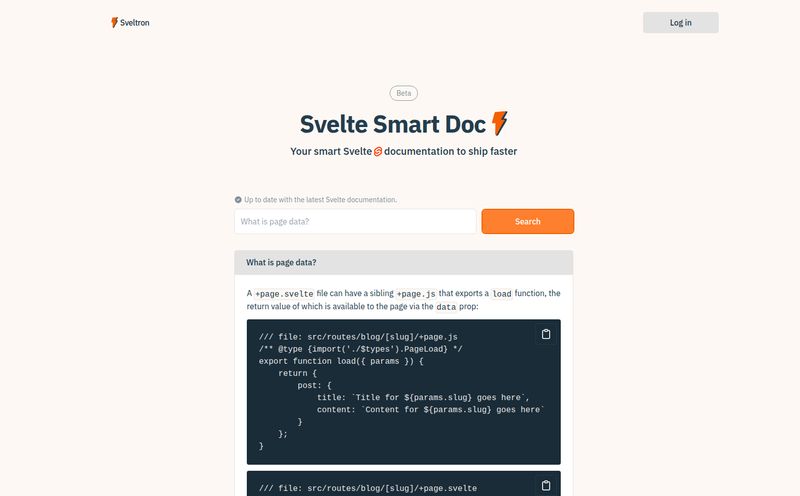Learning to code, or even just staying sharp as a seasoned dev, can sometimes feel like trying to drink from a firehose. You’ve got documentation tabs open that could crash a browser, a dozen Stack Overflow threads that kinda answer your question, and that nagging feeling you’re about to bother the one senior dev on your team for the fourth time today. We've all been there.
So when I stumbled upon a tool promising to be an “AI coding mentor” that lives right inside Slack, my curiosity was definitely piqued. It's called Taiga. The idea is simple, but powerful: what if you could get instant, intelligent coding help without ever leaving your main communication hub? No more context switching. No more bugging colleagues. Just a direct line to an AI assistant trained on solid software engineering principles.
Naturally, I had to take it for a spin. Is it just another chatbot with a fancy name, or is it a genuinely useful addition to a developer's toolkit? Let's get into it.
What Exactly is Taiga? (And Why Should You Care?)
At its core, Taiga is an AI assistant, built by the folks at Coyotiv School of Software Engineering, that integrates directly into your Slack workspace. You can chat with it in a direct message or pull it into a team channel to ask… well, pretty much anything coding-related. Think of it less like a search engine and more like a patient, always-on tutor.
The promise isn't just about getting quick answers. It's about learning smarter. Taiga aims to provide explanations with real-life examples, break down complex topics into digestible chunks, and even help you map out a study plan. In a world saturated with AI tools, one that focuses on education within your existing workflow feels different. It feels practical.

Visit Taiga
Putting Taiga to the Test: My First Impressions
Getting started was refreshingly simple. A few clicks to authorize it for my Slack workspace, and it was there, ready to go. No complicated setup, no long onboarding manual. I love that.
To kick things off, I decided to throw it a classic softball question I saw on their examples page: “Explain Kubernetes Pods like I’m 10.”
The response was… surprisingly good. It used a simple analogy involving a lunchbox (the Pod) holding different food items that work together (the containers). It was clear, concise, and didn’t drown me in technical jargon. Okay, good start.
Next, I tried something more practical: “I need to sort an array of objects in Javascript by a 'date' property. Show me the best way to do it.” It quickly returned a clean code snippet using the .sort() method with a custom comparator function, explaining why it works. This is the kind of stuff that saves you a 5-minute trip to MDN or a saved Gist. It's a small win, but those small wins add up throughout the day.
The Features That Actually Matter
Any tool can boast a long list of features, but which ones actually make a difference in your day-to-day? After playing around with Taiga for a while, a few things really stood out to me.
Instant Feedback Without the Annoyance Factor
This is the big one for me. There's a certain social friction to asking questions, especially ones you feel you should know the answer to. Taiga removes that completely. It's a judgment-free zone. You get instant feedback on a piece of code or a concept, which creates a much faster learning loop than waiting for a PR review or finding the right moment to interrupt a teammate.
Learning That Feels… Personal?
The conversational nature of the interaction makes a huge difference. You can ask follow-up questions, request the answer be simplified, or ask for another example. It feels less like querying a database and more like a genuine dialogue. This personalized approach means you can drill down on a topic until it really clicks, which is something static documentation just can't offer.
It Lives Where You Work: The Slack Integration
I can't overstate how important this is. The biggest barrier to adopting a new tool is often the friction of having to go somewhere else to use it. By integrating seamlessly into Slack, Taiga becomes part of the natural flow of work. You can be discussing a bug in a channel, pull Taiga in to get an explanation on a line of code, and resolve the issue right then and there. It’s brilliant.
Who is Taiga Really For?
While it might seem like a tool designed exclusively for beginners, I think its appeal is broader.
- For Junior Developers: It's an absolute game-changer. It’s that patient mentor who’s never too busy to explain what a closure is for the tenth time. It provides a safe environment to build foundational knowledge without fear of judgment.
- For Mid-Level and Senior Devs: Look, none of us have everything memorized. I found myself using it for quick syntax reminders for a language I don't use daily, or to get a quick boilerplate for a unit test. It’s also great for exploring a new library or framework and getting a high-level overview before diving into the dense official docs.
- For Teams and Managers: Taiga can help foster a powerful learning culture. It empowers team members to find answers on their own, reducing the dependency on a few key senior members. This frees up senior devs to focus on more complex architectural problems, a win-win for everyone.
The Not-So-Perfect Bits (Let's Be Honest)
No tool is a silver bullet, and Taiga is no exception. It’s important to go in with the right expectations. Like any AI, its knowledge is based on the data it was trained on. This means a couple of things:
- It Can Be Wrong: While my experience was largely positive, you should always treat AI-generated code and explanations with a healthy dose of skepticism. Verify its suggestions, especially for critical production code. It's a mentor, not an infallible oracle.
- Knowledge Cutoff: It might not be aware of the absolute latest, bleeding-edge library update that was released yesterday. For the most current information, official documentation is still your best friend.
These aren't deal-breakers by any means, but they are the reality of working with AI today. It’s a powerful assistant, not a replacement for human expertise and critical thinking.
What's the Damage? A Look at Taiga's Pricing
This is where things get a bit mysterious. As of writing this, finding a clear pricing page for Taiga was a bit of a treasure hunt that ended at a 404 page. The primary call-to-action is simply "Add Taiga to Slack," which suggests it might be operating on a free or freemium model right now, perhaps with premium enterprise features planned for the future.
For now, it seems you can add it and start using it without pulling out a credit card, which is the best price of all. I'll definitely be keeping an eye on how this develops.
My Final Verdict: Is Taiga Worth Adding to Your Slack?
So, what’s the bottom line? In my opinion, yes. Absolutely.
Taiga isn't trying to be an all-knowing superintelligence. It's a practical, well-designed tool that solves a very real problem for development teams: the need for accessible, on-demand knowledge. It lowers the barrier to asking questions, speeds up problem-solving, and encourages continuous learning, all within the tool you already have open all day.
It won't write your entire application for you, and it won't replace the invaluable experience of a human mentor. But it can make you a more efficient, knowledgeable, and independent developer. And for a tool that you can add to your workspace for free right now, that's an incredible value proposition. Give it a shot; I think you’ll be pleasantly surprised.
Frequently Asked Questions about Taiga
- What is Taiga AI?
- Taiga is an AI-powered coding mentor that integrates directly into your Slack workspace. It's designed to provide instant answers, code examples, and explanations on software engineering topics in a conversational way.
- How does Taiga integrate with Slack?
- You can add Taiga to your Slack workspace like any other app. Once installed, you can interact with it via direct message for private questions or add it to team channels to collaborate on problems with colleagues.
- Is Taiga suitable for experienced developers?
- Yes. While it's incredibly helpful for junior developers, senior devs can use it for quick syntax checks, exploring new technologies, generating boilerplate code, or getting a quick second opinion on an approach without breaking their focus.
- Is Taiga free to use?
- As of late 2023, Taiga appears to be free to add to Slack. Pricing information is not publicly available, which may indicate a freemium model or that it is currently in a free beta or introductory period.
- Can Taiga replace human mentors?
- No. Taiga is best viewed as a supplementary tool. It's a fantastic resource for instant answers and learning, but it cannot replace the nuanced guidance, career advice, and deep contextual understanding that a human mentor provides.
- What kind of questions can I ask Taiga?
- You can ask a wide range of questions, from simple definitions ("What is an API?") and code syntax ("How do I map an array in Python?") to more complex concepts ("Explain the difference between monoliths and microservices") and even requests for study plans ("Give me a roadmap to learn Go").
Conclusion
In the ever-growing sea of AI tools, Taiga carves out a smart niche for itself. By focusing on practical, in-workflow education, it does more than just give answers—it empowers developers to learn and grow. It’s a small addition to Slack that can have a big impact on a team's productivity and knowledge base. It's earned its spot in my workspace.
Reference and Sources
- Taiga Official Website: https://www.taiga.land/
- Coyotiv School of Software Engineering: https://coyotiv.com/



